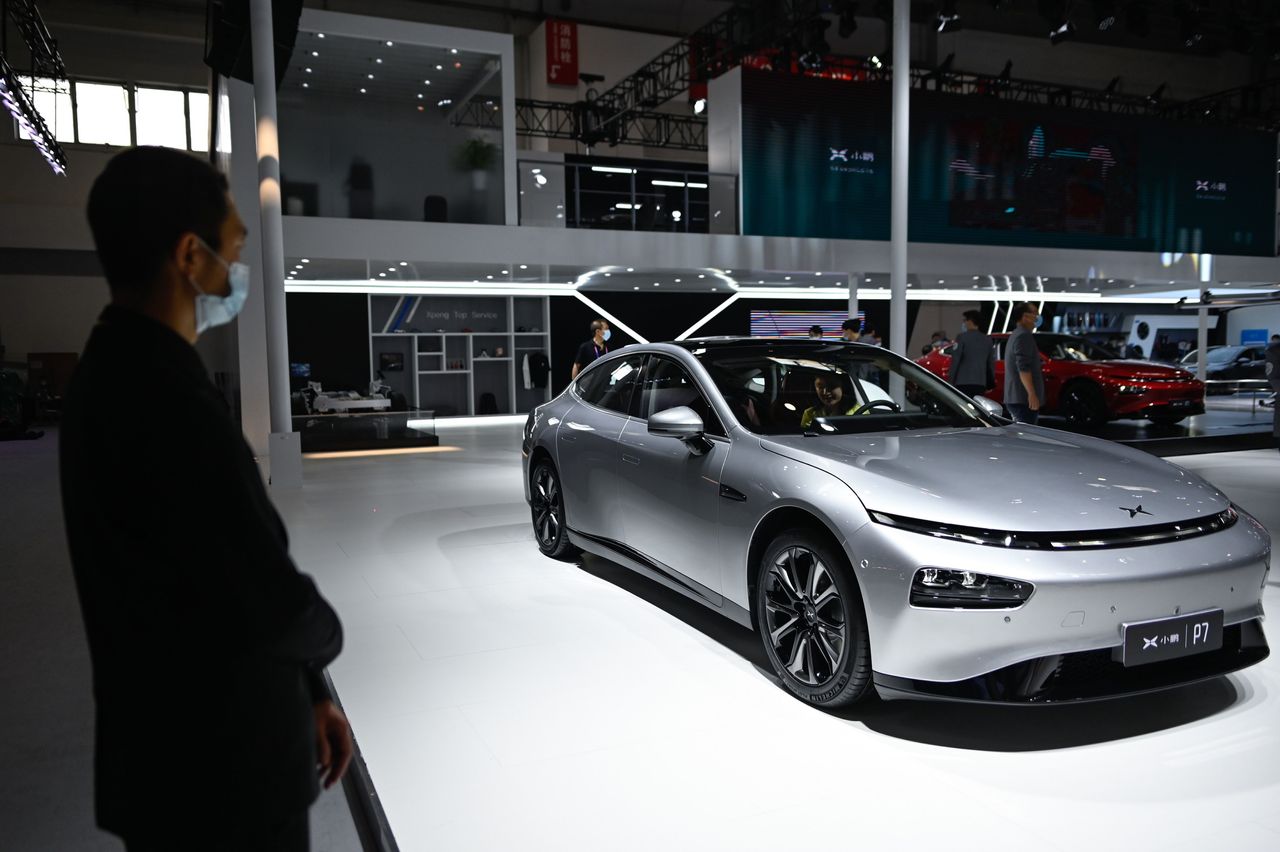XPeng To Offer Cheaper Batteries. The EV Industry Continues to Mature.
Chinese EV maker XPeng is making a battery decision it hopes will give it a leg up on the competition.
Batteries and battery- management systems are to an electric vehicle what a high-quality internal combustion engine is to a gasoline-powered car, so battery decisions can make or break an EV maker. Chinese EV maker XPeng is making a battery decision it hopes will give it a leg up on the competition.
XPeng (ticker: XPEV) is going to start selling LFP-battery-powered electric vehicles soon. China’s Ministry of Industrial Information & Technology recently announced that XPeng was using LFP batteries in vehicles.
LFP is short for lithium-iron-phosphate. Iron is the “F” in that acronym because its elemental symbol is “Fe.” Lithium-iron-phosphate batteries are a little cheaper than top-of-the line lithium-ion batteries, which contain elements such as cobalt and nickel.
LFP batteries are more cost-effective, but with a trade-off. They don’t pack quite as much punch as their more expensive cousins, so the range of the cars that use them is affected.
XPeng, in this case, probably doesn’t mind because most drivers don’t need 482 kilometres, or even 320 kilometres, of daily range. The benefit of a lower purchase cost, for many car buyers, far exceeds the downside of a lower per-charge range. The company will continue to offer vehicles with top-of-the line lithium-ion batteries as well.
It’s an interesting decision for investors to ponder. Offering different batteries in an EV is a little like offering different engines in traditional automobiles. In traditional cars, however, engine options are usually tied to horsepower and speed. In the case of EVs, battery options are more about range.
Billions of dollars are being invested in the EV industry to come up with more powerful, longer-lasting batteries. QuantumScape (QS), for instance, is working on revolutionary solid-state battery technology. QuantumScape doesn’t have sales yet, but it is one of the most valuable automotive suppliers in the world. That’s how important batteries are to the EV industry.
QuantumScape’s batteries will, holders of the stock hope, be less expensive for the same range as existing technology. Commercial offerings are years down the road, though. XPeng’s move is another way to offer less expensive EVs today.
A lower- end XPeng model P7 costs about 230,000 yuan, or about $35,000. With LFP batteries, that price might drop 20,000 to 30,000 yuan, or perhaps $3,000 to $5,000. XPeng declined to comment on new pricing for EVs with the less expensive batteries, but noted that the information will come out soon.
It feels like a sound strategic move and one that investors can expect other EV makers to copy. Car buyers are still learning how to buy EVs. Range and cost, compared with traditional cars, can be a mystery. As options such as LFP batteries proliferate, buyers will begin to feel more comfortable comparing EV models, just like they do when selecting what engine they want in their automobile.
XPeng stock was up 3.3% in premarket trading. S&P 500 and Dow Jones Industrial Average futures were up about 0.5%.
The rise might not be due to the batteries, though. XPeng stock has been on a wild ride lately. Shares dropped 11% Tuesday after investors digested news that deliveries in February were lower than in January. February, however, was affected by the Lunar New Year holiday. Monthly deliveries at Li Auto (LI) and NIO (NIO) dipped as well.
Year to date, XPeng share are down about 26% after finishing 2020 up almost 200% from the stock’s $15 initial public offering price.
 Copyright 2020, Dow Jones & Company, Inc. All Rights Reserved Worldwide. LEARN MORE
Copyright 2020, Dow Jones & Company, Inc. All Rights Reserved Worldwide. LEARN MORE
This stylish family home combines a classic palette and finishes with a flexible floorplan
Just 55 minutes from Sydney, make this your creative getaway located in the majestic Hawkesbury region.
Continued stagflation and cost of living pressures are causing couples to think twice about starting a family, new data has revealed, with long term impacts expected
Australia is in the midst of a ‘baby recession’ with preliminary estimates showing the number of births in 2023 fell by more than four percent to the lowest level since 2006, according to KPMG. The consultancy firm says this reflects the impact of cost-of-living pressures on the feasibility of younger Australians starting a family.
KPMG estimates that 289,100 babies were born in 2023. This compares to 300,684 babies in 2022 and 309,996 in 2021, according to the Australian Bureau of Statistics (ABS). KPMG urban economist Terry Rawnsley said weak economic growth often leads to a reduced number of births. In 2023, ABS data shows gross domestic product (GDP) fell to 1.5 percent. Despite the population growing by 2.5 percent in 2023, GDP on a per capita basis went into negative territory, down one percent over the 12 months.
“Birth rates provide insight into long-term population growth as well as the current confidence of Australian families,” said Mr Rawnsley. “We haven’t seen such a sharp drop in births in Australia since the period of economic stagflation in the 1970s, which coincided with the initial widespread adoption of the contraceptive pill.”
Mr Rawnsley said many Australian couples delayed starting a family while the pandemic played out in 2020. The number of births fell from 305,832 in 2019 to 294,369 in 2020. Then in 2021, strong employment and vast amounts of stimulus money, along with high household savings due to lockdowns, gave couples better financial means to have a baby. This led to a rebound in births.
However, the re-opening of the global economy in 2022 led to soaring inflation. By the start of 2023, the Australian consumer price index (CPI) had risen to its highest level since 1990 at 7.8 percent per annum. By that stage, the Reserve Bank had already commenced an aggressive rate-hiking strategy to fight inflation and had raised the cash rate every month between May and December 2022.
Five more rate hikes during 2023 put further pressure on couples with mortgages and put the brakes on family formation. “This combination of the pandemic and rapid economic changes explains the spike and subsequent sharp decline in birth rates we have observed over the past four years,” Mr Rawnsley said.
The impact of high costs of living on couples’ decision to have a baby is highlighted in births data for the capital cities. KPMG estimates there were 60,860 births in Sydney in 2023, down 8.6 percent from 2019. There were 56,270 births in Melbourne, down 7.3 percent. In Perth, there were 25,020 births, down 6 percent, while in Brisbane there were 30,250 births, down 4.3 percent. Canberra was the only capital city where there was no fall in the number of births in 2023 compared to 2019.
“CPI growth in Canberra has been slightly subdued compared to that in other major cities, and the economic outlook has remained strong,” Mr Rawnsley said. “This means families have not been hurting as much as those in other capital cities, and in turn, we’ve seen a stabilisation of births in the ACT.”
This stylish family home combines a classic palette and finishes with a flexible floorplan
Just 55 minutes from Sydney, make this your creative getaway located in the majestic Hawkesbury region.






















